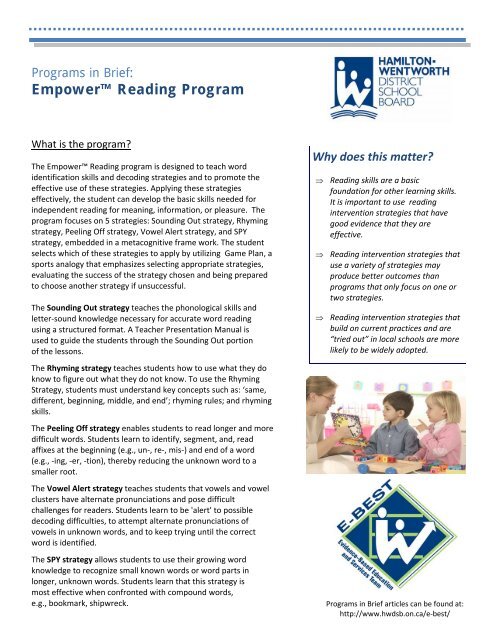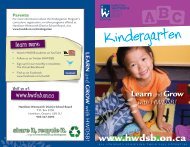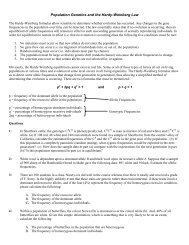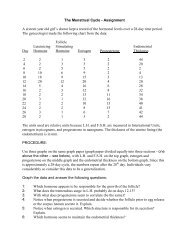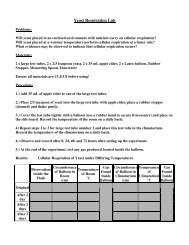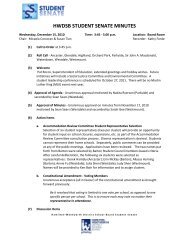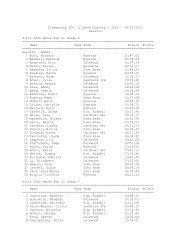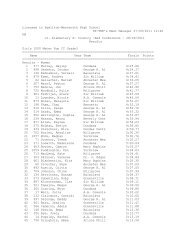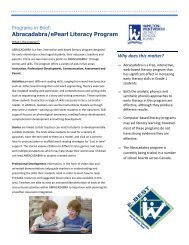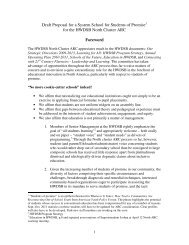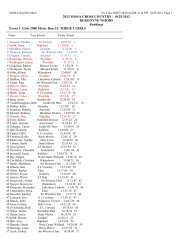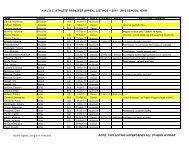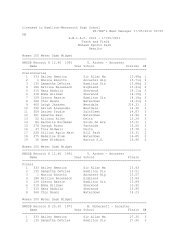Empower™ Reading - Hamilton-Wentworth District School Board
Empower™ Reading - Hamilton-Wentworth District School Board
Empower™ Reading - Hamilton-Wentworth District School Board
Create successful ePaper yourself
Turn your PDF publications into a flip-book with our unique Google optimized e-Paper software.
Programs in Brief:<br />
Empower <strong>Reading</strong> Program<br />
What is the program?<br />
The Empower <strong>Reading</strong> program is designed to teach word<br />
identification skills and decoding strategies and to promote the<br />
effective use of these strategies. Applying these strategies<br />
effectively, the student can develop the basic skills needed for<br />
independent reading for meaning, information, or pleasure. The<br />
program focuses on 5 strategies: Sounding Out strategy, Rhyming<br />
strategy, Peeling Off strategy, Vowel Alert strategy, and SPY<br />
strategy, embedded in a metacognitive frame work. The student<br />
selects which of these strategies to apply by utilizing Game Plan, a<br />
sports analogy that emphasizes selecting appropriate strategies,<br />
evaluating the success of the strategy chosen and being prepared<br />
to choose another strategy if unsuccessful.<br />
The Sounding Out strategy teaches the phonological skills and<br />
letter‐sound knowledge necessary for accurate word reading<br />
using a structured format. A Teacher Presentation Manual is<br />
used to guide the students through the Sounding Out portion<br />
of the lessons.<br />
The Rhyming strategy teaches students how to use what they do<br />
know to figure out what they do not know. To use the Rhyming<br />
Strategy, students must understand key concepts such as: ‘same,<br />
different, beginning, middle, and end’; rhyming rules; and rhyming<br />
skills.<br />
The Peeling Off strategy enables students to read longer and more<br />
difficult words. Students learn to identify, segment, and, read<br />
affixes at the beginning (e.g., un‐, re‐, mis‐) and end of a word<br />
(e.g., ‐ing, ‐er, ‐tion), thereby reducing the unknown word to a<br />
smaller root.<br />
The Vowel Alert strategy teaches students that vowels and vowel<br />
clusters have alternate pronunciations and pose difficult<br />
challenges for readers. Students learn to be 'alert' to possible<br />
decoding difficulties, to attempt alternate pronunciations of<br />
vowels in unknown words, and to keep trying until the correct<br />
word is identified.<br />
The SPY strategy allows students to use their growing word<br />
knowledge to recognize small known words or word parts in<br />
longer, unknown words. Students learn that this strategy is<br />
most effective when confronted with compound words,<br />
e.g., bookmark, shipwreck.<br />
Why does this matter?<br />
<strong>Reading</strong> skills are a basic<br />
foundation for other learning skills.<br />
It is important to use reading<br />
intervention strategies that have<br />
good evidence that they are<br />
effective.<br />
<strong>Reading</strong> intervention strategies that<br />
use a variety of strategies may<br />
produce better outcomes than<br />
programs that only focus on one or<br />
two strategies.<br />
<strong>Reading</strong> intervention strategies that<br />
build on current practices and are<br />
“tried out” in local schools are more<br />
likely to be widely adopted.<br />
Programs in Brief articles can be found at:<br />
http://www.hwdsb.on.ca/e‐best/
Empower <strong>Reading</strong> Program<br />
How is the program delivered?<br />
The program consists of 110 lessons, each an hour in<br />
length. The program is designed to be delivered five<br />
days a week, and completed within one school year. It<br />
is designed to be delivered in small groups of 4 to 8<br />
students, and requires a dedicated space for the<br />
posting of support materials.<br />
Teachers who wish to be trained to instruct<br />
Empower <strong>Reading</strong> must participate in a total of four<br />
full day in‐service workshops. Two of these in‐service<br />
days are offered in early September; the two<br />
subsequent in‐services are offered during the school<br />
year. In addition, each teacher is assigned a teacher<br />
mentor who visits the new Empower <strong>Reading</strong><br />
teacher’s class at least four times and offers feedback<br />
and support (e.g., modeling of a class, answering<br />
questions) during these visits. During year two of<br />
teaching Empower the teacher must attend a<br />
refresher in‐service in late September and mentoring<br />
is ongoing as needed.<br />
The Empower <strong>Reading</strong> program is delivered in<br />
addition to the literacy program in the classroom. It<br />
is not meant to replace any component of the regular<br />
literacy program but is an additional intensive training<br />
program over and above the regular literacy program<br />
that targets specific core deficits.<br />
January 25, 2012<br />
Who is the program aimed at?<br />
The Empower <strong>Reading</strong> program is<br />
recommended for children who are in grades 2<br />
to 5, are having significant difficulty acquiring<br />
age‐appropriate reading skills, specifically in the<br />
areas of phonological awareness and decoding,<br />
speak English as a first language or are English<br />
language learners, and have low average to<br />
above average cognitive ability.<br />
Empower TM in HWDSB<br />
Empower was first introduced into 10 HWDSB<br />
schools during the 2006/07 school year and has<br />
expanded to include 46 elementary schools in<br />
2010/11. Three special assignment teachers<br />
support the training of new Empower teachers<br />
and offer mentorship to all to ensure program<br />
fidelity.<br />
What’s the evidence the program works?<br />
The Empower <strong>Reading</strong> program was developed by<br />
the Learning Disabilities Research Program at the<br />
Hospital for Sick Children. Information about the<br />
program is available at: http://www.sickkids.ca/LDRP/<br />
Empower‐<strong>Reading</strong>/index.html<br />
Component parts of the program have been the<br />
subject of several evaluations in recent years, and<br />
there is good evidence that these components are<br />
effective. Details of these evaluations are available in:<br />
Lovett MW, De Palma M, Frijters JC, Steinbach KA,<br />
Temple M, Benson NJ, Lacerenza L. Interventions for<br />
reading difficulties: a comparison of response to<br />
intervention by ELL and EFL struggling readers.<br />
Journal of Learning Disabilities, 2008, 41(4), 333‐352.<br />
The overall program is currently being evaluated in six<br />
school board districts in Ontario, including HWDSB.<br />
Findings from HWDSB have been positive and a report<br />
is being prepared for publication.


